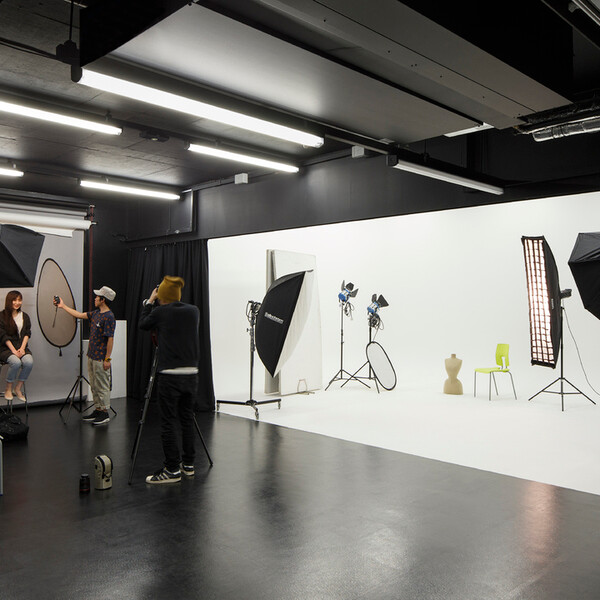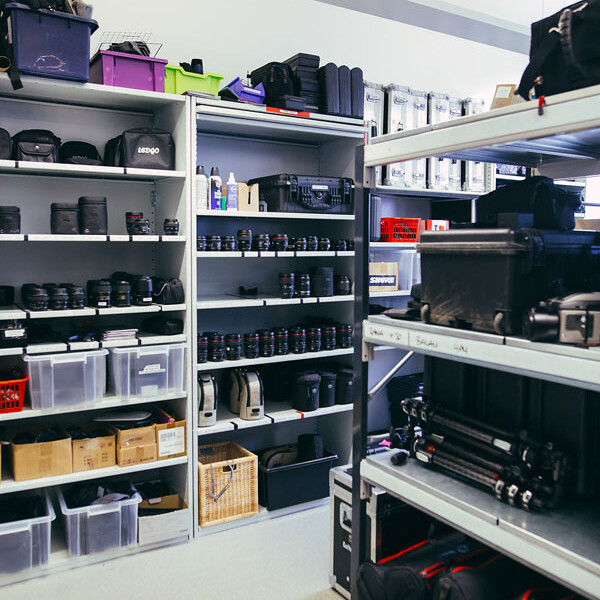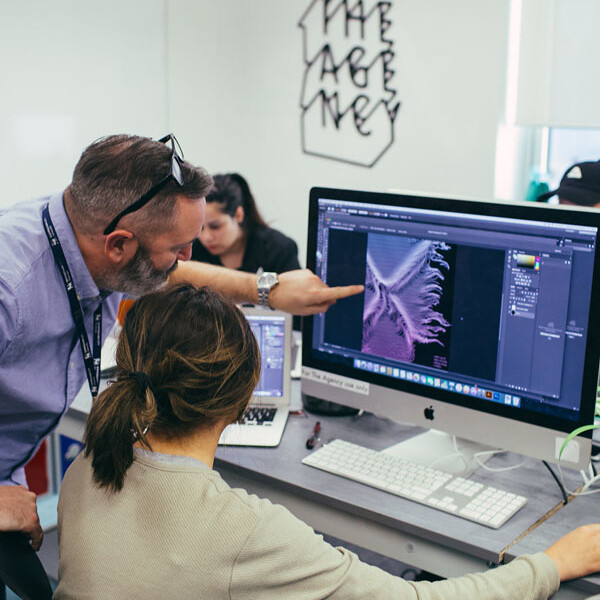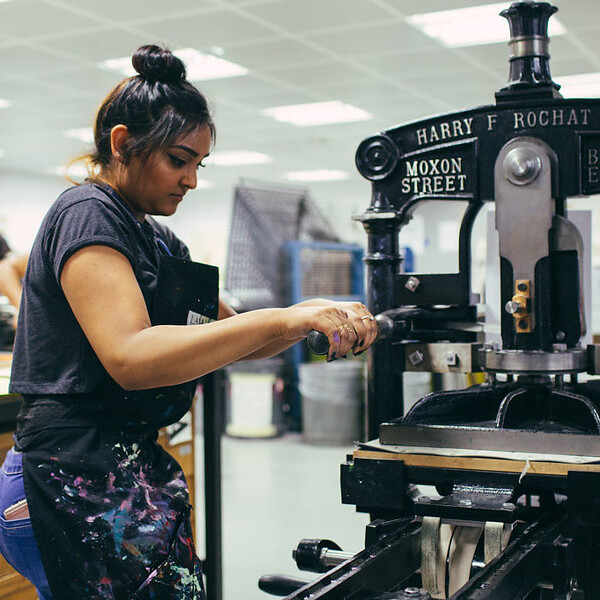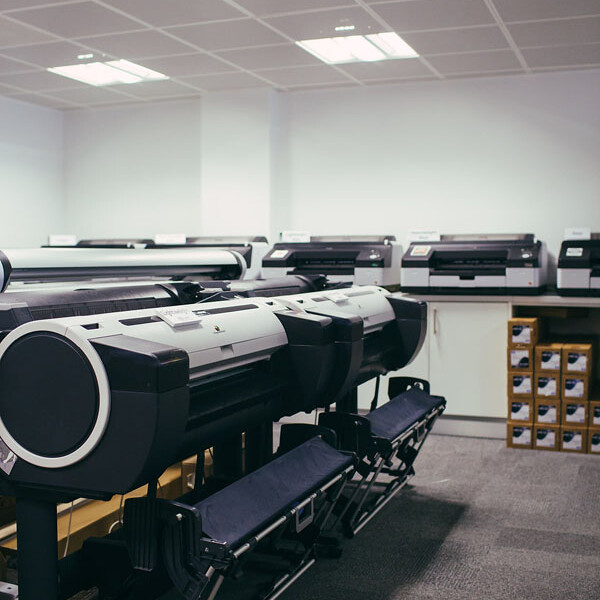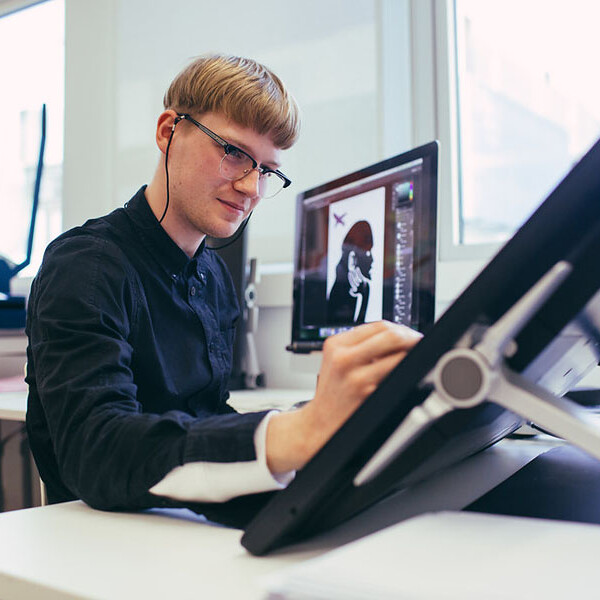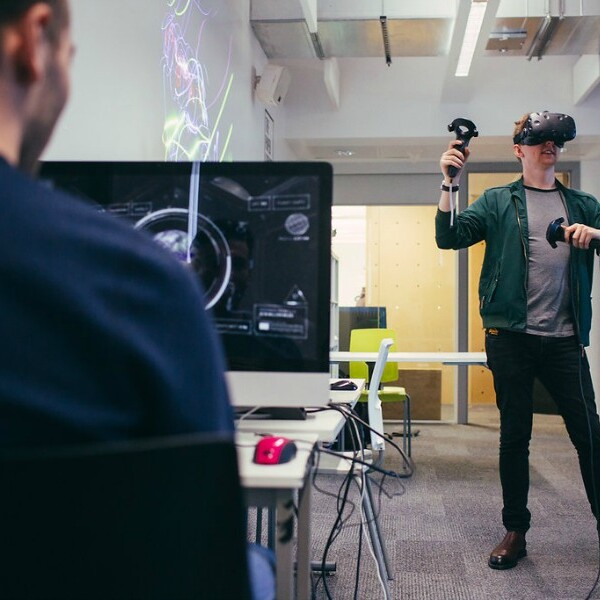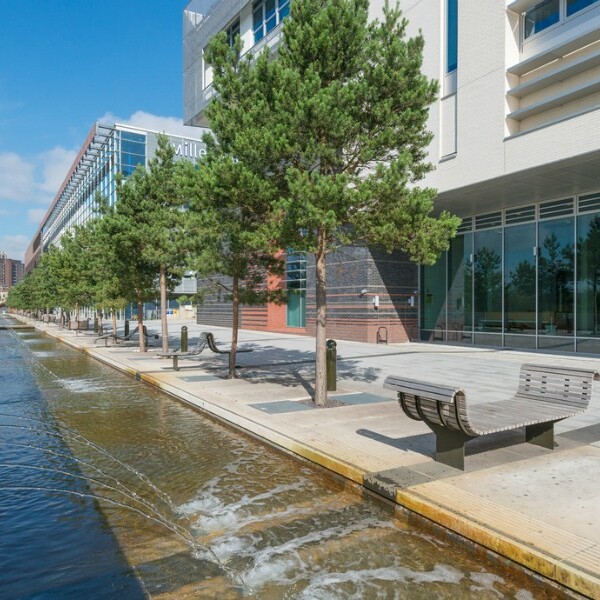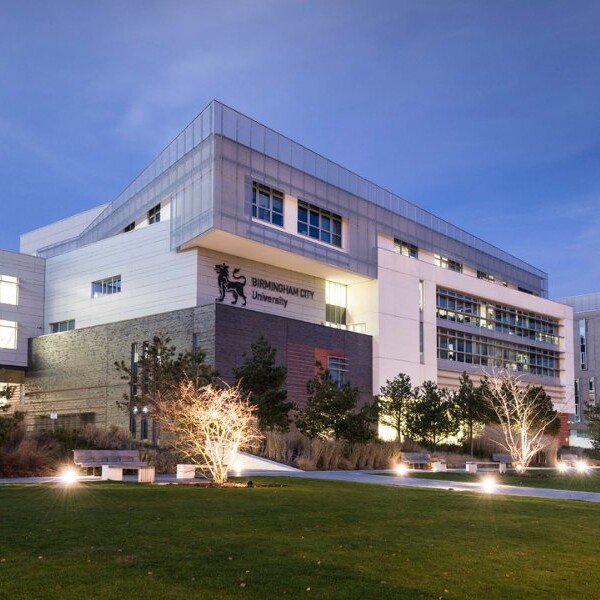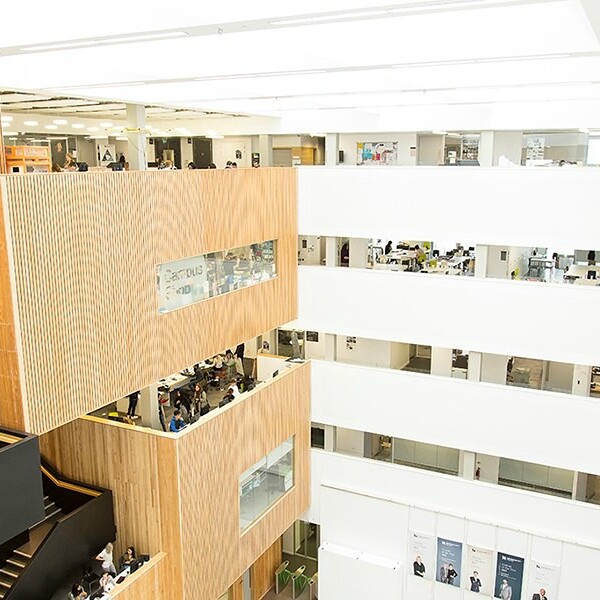Photography - BA (Hons)
Currently viewing course to start in 2025/26 Entry.
On our BA (Hons) Photography degree you will develop a creative, professional identity and signature style by combining technique, theory, experimentation and ethical practice....
- Level Undergraduate
- Study mode Full Time
- Award BA (Hons)
- Start date September 2025
- Fees View course fees
- Subject
- Location City Centre
This course is:
Available with Professional Placement year
Open to International Students
Overview
On our BA (Hons) Photography degree you will develop a creative, professional identity and signature style by combining technique, theory, experimentation and ethical practice.
You will explore contemporary photographic practice, including fashion, documentary, portrait, moving image, landscape, portrait and fine art photography, gaining a rounded knowledge of these varied and exciting disciplines.
Collaboration with other disciplines is encouraged, developing new ideas and connections with subjects such as graphic design, illustration and animation. The course will show you how creative, documentary and arts-based photographers can become commercially successful in a diverse range of careers within the visual arts and beyond.
What's covered in this course?
You will learn through practice, by developing confidence as a contemporary photographer. Your learning will be informed by developing a deeper understanding of current photographic practice, from publishing and exhibiting to editorial and photojournalism work.
You will learn from award-winning staff with international reputations and a wealth of industry experience, having worked for clients such as: the BBC, the Brit Awards, British Telecom, Channel 4, The New Yorker, The Guardian, The Sunday Times Magazine, The Daily Telegraph, The Independent, Marie Claire, Condé Nast, Studio Wayne McGregor, Microsoft, Save the Children, Oxfam, The Red Cross, NHS, the Royal Society of Arts, Tate Britain, Lancôme, Chanel Beaute, London Fashion Week and the Royal Opera House.
There is also a dedicated technical support team and exceptional facilities situated within the City Centre Campus. These include industry-standard photographic studios, darkrooms, television studios, editing suites, a giant green screen studio and an extensive Hires and Loans department.
We will help you to collaborate both within the University (for example, with the fashion, music, acting or product design courses) as well as externally, with live briefs for real clients. You will also have the opportunity to study abroad for part of the course, or to go on trips to destinations such as New York, Berlin and Paris.
We have exceptional levels of external engagement, with visiting lectures given by nationally and internationally-recognised photographers, as well as having numerous links with industry, workshops, seminars, masterclasses, careers advice, portfolio reviews, mentorships and placements.
In an environment of imagination and experimentation, we will nurture your talent and help you to develop into an employable and creative photographer.
Professional Placement Year
This course offers an optional professional placement year. This allows you to spend a whole year with an employer, following successful completion of your second year, and is a great way to find out more about your chosen career. Some students even return to the same employers after completing their studies.
If you choose to pursue a placement year, you will need to find a suitable placement to complement your chosen area of study. You will be able to draw on the University’s extensive network of local, regional, and national employers, and the support of our Careers teams. If you are able to secure a placement, you can request to be transferred to the placement version of the course.
Please note that fees are payable during your placement year, equivalent to 20% of the total full-time course fee for that year.
My time at Birmingham City University was a great training ground to learn and develop the necessary skills to transfer into a creative career. The lecturers have the ability to help mould creative ideas into academic projects, and provide research direction along the way, which produces creative fuel and inspires self-initiated learning.
Nathan Spencer, Photography BA (Hons) graduate
Why Choose Us?
- 100% of students rated the teaching on this course as good or very good (NSS 2024).
- We’re ranked 1st in the UK for Film Production and Photography for two consecutive years (Guardian League Table 2025 and 2024).
- You will have access to incredible industry standard facilities and equipment that will help you express your creativity.
- You will be taught by tutors with extensive industry experience and can help you to gain a foot hold in the profession. You will also have lectures, workshops and portfolio reviews with world-renowned, industry-leading photographers.
- Our course has produced numerous award-winning students, locally, nationally and internationally.
- You will have lectures, workshops and portfolio reviews with world-renowned, industry-leading photographers.
- We allow students to explore a range of related careers, such as filmmakers, creative directors, picture editors or continuing education (such as an MA or PhD).
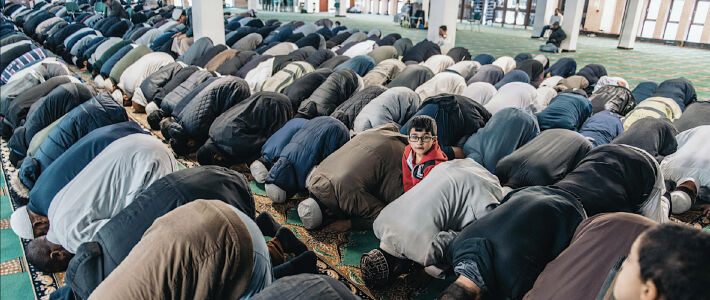
Open Days
Join us for an Open Day where you'll be able to learn about this course in detail, chat to students, explore our campus and tour accommodation. Booking isn't open for this event yet, register your interest and we'll let you know as soon as booking goes live.
Next Open Day: 28 June 2025
Entry Requirements
These entry requirements apply for entry in 2025/26.
All required qualifications/grades must have been achieved and evidenced at the earliest opportunity after accepting an offer to help confirm admission and allow for on-time enrolment. This can also include other requirements, like a fee status form and relevant documents. Applicants can track their application and outstanding information requests through their BCU mySRS account.
Essential requirements
- Standard offer: 112 UCAS Tariff points. Learn more about UCAS Tariff points.
- Accelerate offer: 80 UCAS Tariff points. Find out more about BCU Accelerate.
Applicants will also need to submit a good portfolio.
If you have a qualification that is not listed, please contact us.
Fees & How to Apply
UK students
Annual and modular tuition fees shown are applicable to the first year of study. The University reserves the right to increase fees for subsequent years of study in line with increases in inflation (capped at 5%) or to reflect changes in Government funding policies or changes agreed by Parliament. View fees for continuing students.
Award: BA (Hons)
Starting: Sep 2025
- Mode
- Duration
- Fees
- Full Time
- 3 years
- £9,535 in 2025/26 ✱ Important note for this price
- Apply via UCAS
(↩Back to price) * The Government is proposing to increase the cap on full-time regulated tuition fees to £9,535 for 2025/26 and the University is planning on increasing fees to that maximum level once legislation is enacted. Part-time fees are charged pro-rata, where applicable.
International students
Annual and modular tuition fees shown are applicable to the first year of study. The University reserves the right to increase fees for subsequent years of study in line with increases in inflation (capped at 5%) or to reflect changes in Government funding policies or changes agreed by Parliament. View fees for continuing students.
Award: BA (Hons)
Starting: Sep 2025
- Mode
- Duration
- Fees
- Full Time
- 3 years
- £17,690 in 2025/26
Guidance for UK students
UK students applying for most undergraduate degree courses in the UK will need to apply through UCAS.
The Universities and Colleges Admissions Service (UCAS) is a UK organisation responsible for managing applications to university and college.
Applying through UCAS
- Register with UCAS
- Login to UCAS and complete your details
- Select your course and write a personal statement
- Get a reference
- Pay your application fee and submit your application
Guidance for International students
There are three ways to apply:
1) Direct to the University
You will need to complete our International Application Form and Equal Opportunities Form, and submit them together with scan copies of your original academic transcripts and certificates.
2) Through a country representative
Our in-country representatives can help you make your application and apply for a visa. They can also offer advice on travel, living in the UK and studying abroad.
3) Through UCAS
If you are applying for an undergraduate degree or a Higher National Diploma (HND), you can apply through the UK’s Universities and Colleges Admissions Service (UCAS).
You can request a printed form from your school or nearest British Council office. You will be charged for applying through UCAS. Birmingham City University’s UCAS code is B25 BCITY.
Portfolio guidance
If you receive an offer to study this course, you will be required to submit a portfolio. We ask that this is submitted within four weeks of receiving your offer.
Please see our portfolio guidance page for tips on putting your portfolio together.
Portfolio guidance
If you receive an offer to study this course, you will be required to submit a portfolio. We ask that this is submitted within four weeks of receiving your offer.
Please see our portfolio guidance page for tips on putting your portfolio together.
Personal statement
UK / EU students are required to submit a personal statement as part of their application for this course.*
The personal statement gives you a crucial opportunity to say why you’re applying and why the institution should accept you.
Here are the key areas you’ll need to address:
- Course choice - Why does this course appeal? What areas are of particular interest?
- Career plans - If you have a specific career in mind, say how your chosen course will help you pursue this goal.
- Work experience - Mention any work that is relevant to your subject, highlighting the skills and experience gained.
- School or college experience - Highlight skills gained at school/college, eg summer schools or mentoring activities.
- Non-accredited skills or achievement - eg Duke of Edinburgh Award, Young Enterprise scheme.
You should also mention your future plans – if you’re planning to take a year out, don't forget to give your reasons. Talk about any subjects you’re studying that don’t have a formal assessment and any sponsorships or placements you’ve applied for. And don't be scared to add in details about your social, sports or leisure interests.
Worried about Personal Statements?
If you've got no idea where to start or just want to check you're on the right track, we’ve got expert advice and real examples from our students to help you nail your personal statement. You can even download our ultimate personal statement guide for free.
*Non-EU students are not required to submit a personal statement when applying for this course.
Course in Depth
First Year
In the first year of the course we will provide you with the foundations of photographic and moving image practice. This will include essential technical skills using our state-of-the-art facilities, an understanding of how to harness and develop your creativity, means of communicating a message through your work, and an appreciation of the ethical and social issues that all modern photographers should be aware of.
The module ‘Introduction to Photography’ will support your transition into Higher Education by furnishing you with the key principles of the discipline, introducing you to your academic and technical staff and getting to know your fellow students, You will develop your knowledge and application of photography while investigating the wider context and influence of photography. It will be an opportunity to work alongside your peers and to witness photographic skills and interests different to your own.
This module will introduce you to historical and contemporary concepts within a number of photographic genres. The module is designed to establish basic workshop skills that are specifically the building blocks for future modules. This module is structured to you with an appropriate level of digital techniques that both support the module and are transferable. The module will result in a body of work that is the outcome of a set project and one day briefs.
This module is about moving from the safety of the classroom and into the exterior world. As part of the module you will be expected to take your work into a public domain. You will be honing your practice through engagement and collaboration with external bodies, and beginning to identify your direction of study. The module is designed to establish advanced workshop skills and an appropriate level of enterprise skills.
Building on the key principles articulated in the three modules in your first semester, this complementary, contextual studies module will explore seminal design movements and practitioners of the twentieth and twenty-first centuries. It will provide you with a broad contextual framework that will underpin your design practice, both at university and in the future.
In order to complete this course a student must successfully complete at least 20 credits from the following indicative list of OPTIONAL modules.
The ‘Space and Place’ optional L4 module is designed to equip students with a good understanding of the issues surrounding these two areas. This will be achieved through a conceptual and practical understanding of the narrative process. You will learn, whilst working individually and collaboratively, important skills that will both develop your own practice as well as giving you key insights into other areas of visual communication. In turn, this will help improve your understanding of contemporary practice in the creative industries.
The ‘Time and Sequence’ optional L4 module is designed to equip students with a good understanding of the issues surrounding these two areas. This will be achieved through a conceptual and practical understanding of the narrative process. You will learn, whilst working individually and collaboratively, important skills that will both develop your own practice as well as giving you key insights into other areas of visual communication. In turn, this will help improve your understanding of contemporary practice in the creative industries.
The ‘Sound and Movement’ optional L4 module is designed to equip students with a good understanding of the issues surrounding these two areas. This will be achieved through a conceptual and practical understanding of the narrative process. You will learn, whilst working individually and collaboratively, important skills that will both develop your own practice as well as giving you key insights into other areas of visual communication. In turn, this will help improve your understanding of contemporary practice in the creative industries.
The ‘Text and Image’ optional L4 module is designed to equip students with a good understanding of the issues surrounding these two areas. This will be achieved through a conceptual and practical understanding of the narrative process. You will learn, whilst working individually and collaboratively, important skills that will both develop your own practice as well as giving you key insights into other areas of visual communication. In turn, this will help improve your understanding of contemporary practice in the creative industries.
The ‘People and Identity’ optional L4 module is designed to equip students with a good understanding of the issues surrounding these two areas. This will be achieved through a conceptual and practical understanding of the narrative process. You will learn, whilst working individually and collaboratively, important skills that will both develop your own practice as well as giving you key insights into other areas of visual communication. In turn, this will help improve your understanding of contemporary practice in the creative industries.
Core modules are guaranteed to run. Optional modules will vary from year to year and the published list is indicative only.
Second Year
In the second year, you will further develop your signature style, moving rapidly towards your chosen career goal. This will be achieved by developing your portfolio, your photographic intelligence and your conceptual knowledge. Furthermore, you will start to define the type of photographer that you want to become, becoming increasingly specialised in that area.
Creative briefs will help you to understand personal photographic direction and may include a collaborative module may allow you to work with Graphic Designers, Illustrators, Sound artists, Film makers, animators and galleries.
You will also be encouraged to collaborate with others outside this, building industry links that enhance your work and skills.
You will also gain essential business skills to prepare you for undertaking commissions and projects. Live briefs are a key part of the second year, so you that you experience what it is really like to work as a professional creative photographer.
You will begin to focus on a more discreet area of specialism, preparing you for your final year of study. You will work within smaller groups, alongside a tutor with expert knowledge in your chosen specialist area. You will also identify and research an area of your profession, developing numerous life and creative skills that will enhance your abilities and aspirations beyond graduation. This aspect of the programme will be supported by seminars and lectures from industry experts and practitioners.
This flexible module allows you to identify direction within your own practice and future aspirations. You will undertake approaches that will help define your area of practice, which is personalised to your own interests. The structure of this module encourages the development of a more focused, in depth and advanced study through the use of self-directed projects.
This module provides an opportunity for you to apply your knowledge and skills to an external, professional brief. The brief will be set by an external client/ agency, in consultation with your supervisor, and it could be a ‘real life’ problem to be solved, or a simulation. It is an opportunity for you to engage in a professional manner with an aspect of your subject area, which contributes to the development of employability skills within the supportive infrastructure of the University. Where appropriate, the project may involve interdisciplinary collaboration with students from other courses. In this way, it reflects the collaborative, flexible nature of employment within the Creative Industries.
In order to complete this course a student must successfully complete at least 20 credits from the following indicative list of OPTIONAL modules.
The purpose of this module is to enable you to develop professional attributes and subject skills through experience in the work place, and to critically reflect upon your learning in that context. You will normally be expected to arrange your own placement, with support from academic staff and ADM Careers+.
The module is an opportunity to learn and critically reflect on the skills of collaboration by enabling you to create an interdisciplinary project with students from complementary disciplines, or with academic staff. Collaboration is a vital employability skill within the Creative Industries and this module allows you to develop these skills, making use of University facilities and with the support of academic staff. Within this module framework, several kinds of collaborative opportunities are available.
Core modules are guaranteed to run. Optional modules will vary from year to year and the published list is indicative only.
Third Year
In the final year you will, under expert tutor guidance, define your own projects, ensuring that your university work is tailored perfectly to you. You will work towards a final outcome, again chosen by you, such as a book, magazine, film, installation, exhibition and/or portfolio. As before, we will help you to develop your business profile and to become a practising photographer before you have graduated, which only goes to strengthen your portfolio and your employability.
We will be there to support you both professionally and pastorally. As well as our own expert tuition, we have a wide range of world-class photographers and portfolio reviewers who will inspire you to take your work to the next level. You will have access to the huge network of contacts that the University has, both nationally and internationally, as well as our close links with other courses within the University.
You will also undertake a piece of critical writing that examines the business practices of your chosen career. This will equip you with the necessary knowledge to confidently enter the photographic industry, preparing you for your future aspirations and increasing your level of employability, allowing you to flourish not just while studying, but for many years after.
Having developed and defined your direction of study throughout Level 5, you will now advance your practice as you enter your final year of study. This module will provide you with the opportunity to adopt an increasingly autonomous commitment to your individual direction. At this stage, a focused attitude is essential in developing an informed and contextualised approach to your thinking, ongoing project development, and outcomes.
The key aim of this module is to build upon the work undertaken in previous modules and contextualise this within a written assignment or its equivalent, that frames both your work and identifies possible future direction. You will look to achieve this through the collection and use of both primary and secondary research. This should be used to support a deeper understanding of your discipline and practices, with further analysis used to help shape your on-going development as a successful creative.
The purpose of this module is to enable you to undertake a sustained, in-depth and theoretically informed project. It is a culmination of your three years of study and should be a personal inquiry, of a professional and innovative standard and a celebration of you as a work ready practitioner.
You will develop a final major body of work, demonstrating your skills and knowledge which will be showcased at our Graduate Shows. You will have an exhibition, showcasing your individual creative signature, communication, information and problem-solving skills. You will develop your negotiation and planning skills, and will produce meaningful creative work.
Download course specification
Download nowCourse structure
During the Photography course you will develop yourself as a creative practitioner, developing hands-on experience, producing high quality, dynamic work. Creative thinking is encouraged throughout and you will experience a high level of industry engagement through practice-based learning.
Studio contact sessions consist of lectures, tutorials, workshops, seminars and group activities in numerous combinations. Additional to these scheduled hours you will be expected to undertake guided independent learning. You will use the facilities within the Faculty and beyond to further develop your individual projects.
We offer a suite of optional technical workshops including printmaking, studio lighting and a wide range of software packages.
Trips and Visits
While you study the course you will be offered opportunities to go on group excursions both in the UK and abroad, to destinations such as Venice, Berlin and New York.
You will also have an opportunity to study abroad in your second year, as part of the university exchange ‘Turing Scheme’.
Further Study
As graduating students you will naturally follow your own career path and that may mean going straight into industry.
However, many students look at the opportunities that we offer for postgraduate study at Birmingham City University. It is important to keep your options open and researching further into your area of study brings many rewards.
We run MA Visual Communication and MA Fine Art courses, as a natural progression from creative undergraduate courses. Should you wish to, you will be encouraged to continue your journey with us and develop your practice further.
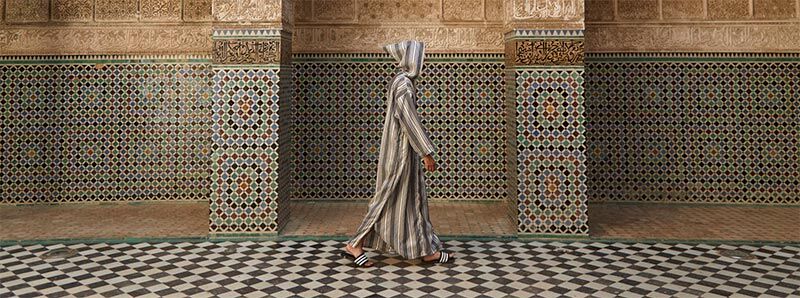
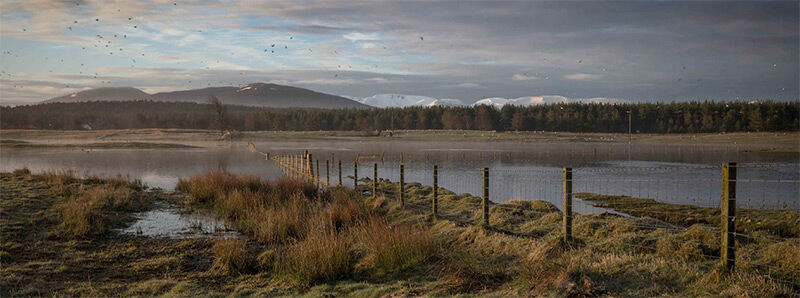
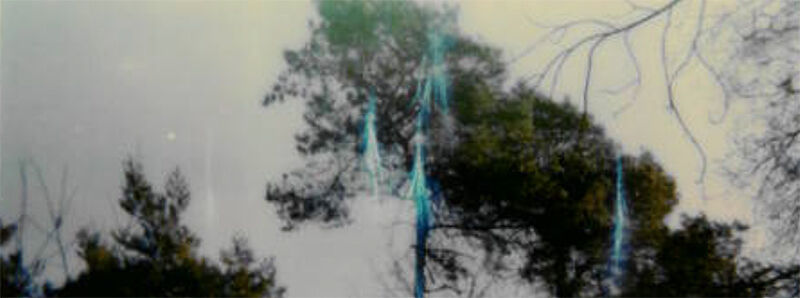
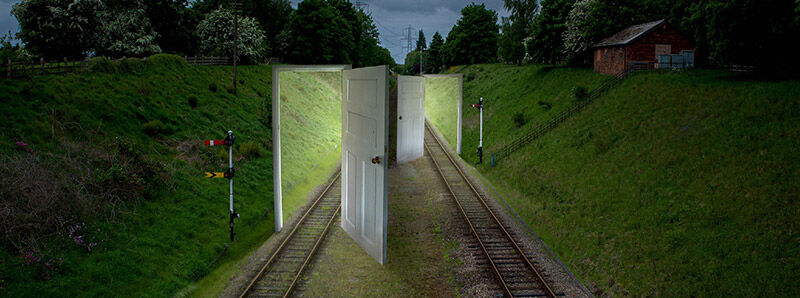
Employability
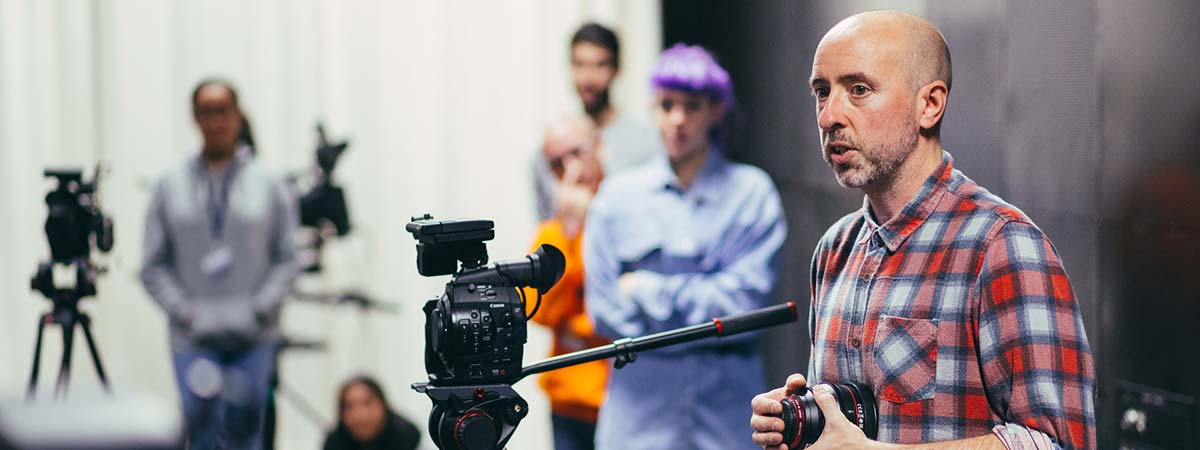
Enhancing employability skills
The BA (Hons) Photography course at Birmingham City University is designed to furnish you with both creative and employability skills, thoroughly preparing you for your future career.
The course contains numerous employability sessions, around topics such as self-promotion, designing your CV and approaching employers as well as the day-to-day knowledge required to be a creative practitioner.
We are fully supported by the Faculty’s Careers+ team, who have direct input into the course and offer a range of opportunities, workshops and advice to all students.
We have modules that allow you to undertake live briefs, work placements and collaborative projects, which can engage you with industry, build your professional network and develop key skills even before you graduate. We have a range of world-class speakers and portfolio reviewers visit us to give you the latest insight into the industry. Previous speakers have included:
- Nadav Kander
- Harry Borden
- Ruth Hogben
- Perou
- Jill Furmanovsky
- Vanley Burke
- Mat Collishaw
- Anderson & Low
Crucially, you will learn to be a creative thinker. This opens up avenues into photography itself, and a range of other career opportunities within the wider creative industries and beyond.
Placements
This course supports fully self-directed study and the development of individual practice. There are opportunities for field trips and study abroad that will add value to the degree course.
Throughout your course you will be encouraged to take on placements, and network with industry. Our students have taken on numerous exciting and challenging placements with organisations such as Tatler magazine, Atlantis Modelling Agency, Free Radio, and Birmingham City Council. Birmingham has illustrious and vibrant creative industries and Birmingham City University has many industry connections. We will encourage you to actively seek work, helping you to develop your professional skills.
In the past our students have worked with organisations such as Birmingham Open Media, The Imaging Warehouse and The Impossible Project.
Links to industry
Our links include: Canon, Panasonic, Capture One, GRAIN Photography Hub and Network, BOM (Birmingham Open Media), Flatpack Film Festival, Studio Wayne McGregor, Free Range, Central School of Make Up, Atlantis Modelling Agency, ARD Production and The Royal Photographic Society. Take a look at how students have worked with industry.
We are in partnership with Grain, The Hub for Photography in the West Midlands. As part of this partnership, we hold portfolio review days and lectures. Research projects are embedded in the future plans for this initiative, bringing wider benefits to the university and the students on the course.
Facilities & Staff
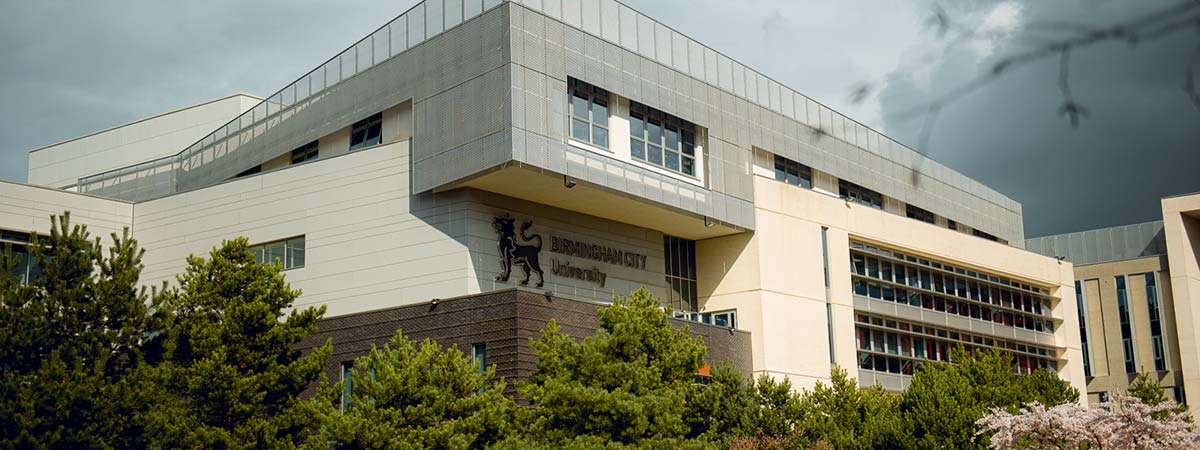
Our creative degrees are housed in the state of the art £62 million Parkside Building, part of our City Centre Campus.
The Parkside Building also offers:
- Professional standard photographic studios
- Darkroom
- Film scanning
- Film processing room
- Large format printing
- Extensive Hires & Loans Department
- Exhibition spaces
- Projection space
Photography technicians
Photography technicians support students across our photographic studios, processing room and analogue darkroom, along with providing workshops and training:
- Andy Pilsbury, Senior Technician
- Barnaby Kent, Senior Technician
- Aimee Sills, Technician
Our staff
Joe Miles
Course Leader BA (Hons) Photography, Interim Course Director of Filmmaking
Specialising in commercial and editorial photography for national and international clients, Joe currently leads the BA (Hons) Photography and BA (Hons) Fashion Imaging courses. Experienced in both film and digital photography he has worked with RED cameras, combining moving and still imagery. His extensive list of clients include:...
More about JoeRavi Deepres
Professor of Moving Image and Photography
Award winning artist, photographer and film maker with an international reputation for focusing on the intersection of the still and moving image. Influences of identity, psychology, social conditioning, historical archives, and scientific cosmological research constantly feed his practice. Expressed through conceptual documentary, choreographic...
More about RaviNick Priest
Lecturer in Photography
Nick is the Level 5 Coordinator and Level 4 Lecturer on the BA (Hons) Photography course. He has a passion for all areas of photography and his practice has led him into documentary and portrait photography, shooting communities, people, places, and readings in psychogeography and sense of place, which is now where his practice lies. Nick’s work...
More about NickStuart Whipps
Senior Lecturer in Photography
Stuart Whipps is an artist based in Birmingham, UK. He often makes work about things he doesn’t understand and doesn’t know how to do. Recently this includes restoring a 1979 Mini with the assistance of former British Leyland workers, training to make geological thin sections at the University of Birmingham, and propagating Begonias at West Dean in...
More about StuartDr Gary Bratchford
Associate Professor of Photography
Gary Bratchford is a writer, editor & curator, and an Associate Professor of Photography. Gary co-edits Visual Studies Journal, Visual Culture in Britian and co-edits the Palgrave Book Series, Social Visualities.
More about GaryJaskirt Boora
Lecturer in Photography
Jaskirt is an award-winning multi-disciplinary artist whose work focuses on a socially engaged practice, working with local communities. She is interested in celebrating untold stories while exploring visual representations of gender, ethnicity and place.
More about Jaskirt






























